2012年中考英语一轮复习7B Unit3讲解
文档属性
| 名称 | 2012年中考英语一轮复习7B Unit3讲解 |
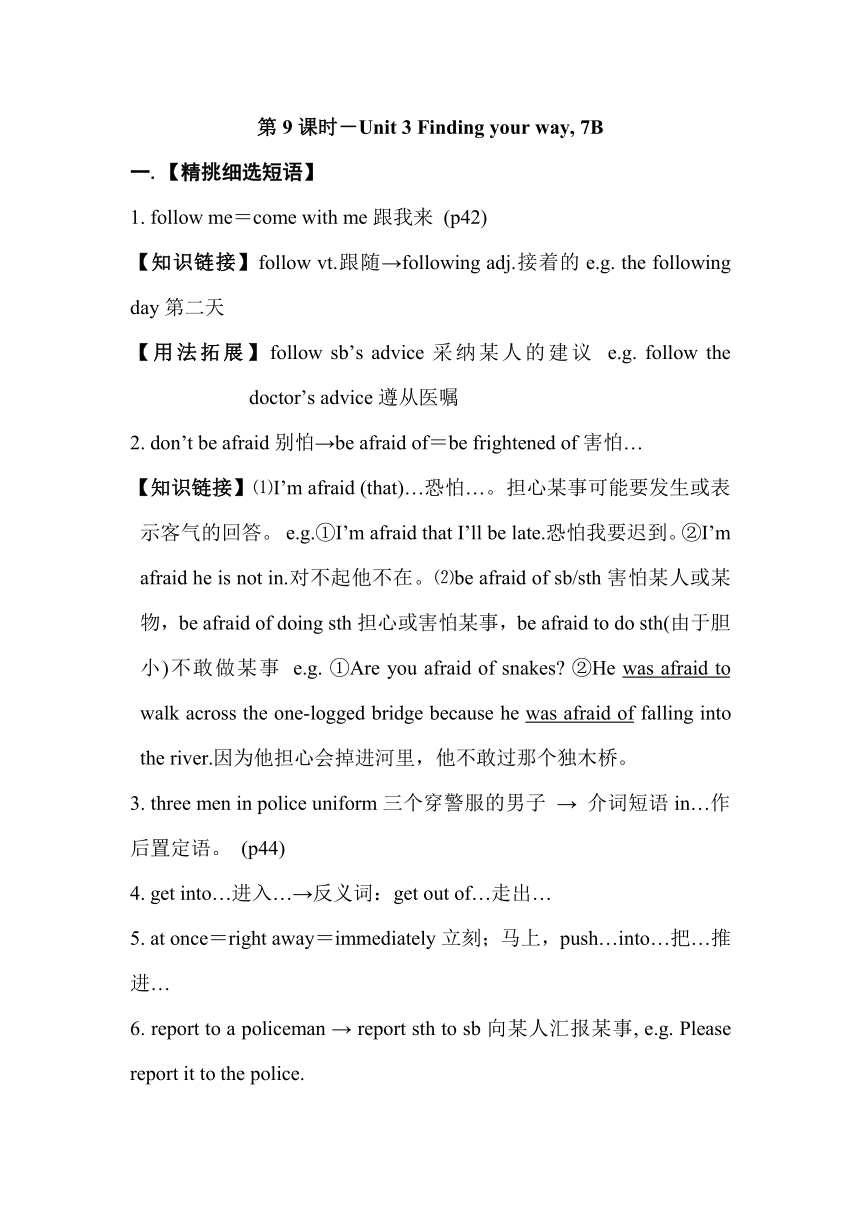
|
|
| 格式 | zip | ||
| 文件大小 | 18.5KB | ||
| 资源类型 | 教案 | ||
| 版本资源 | 通用版 | ||
| 科目 | 英语 | ||
| 更新时间 | 2012-04-26 00:00:00 | ||
图片预览

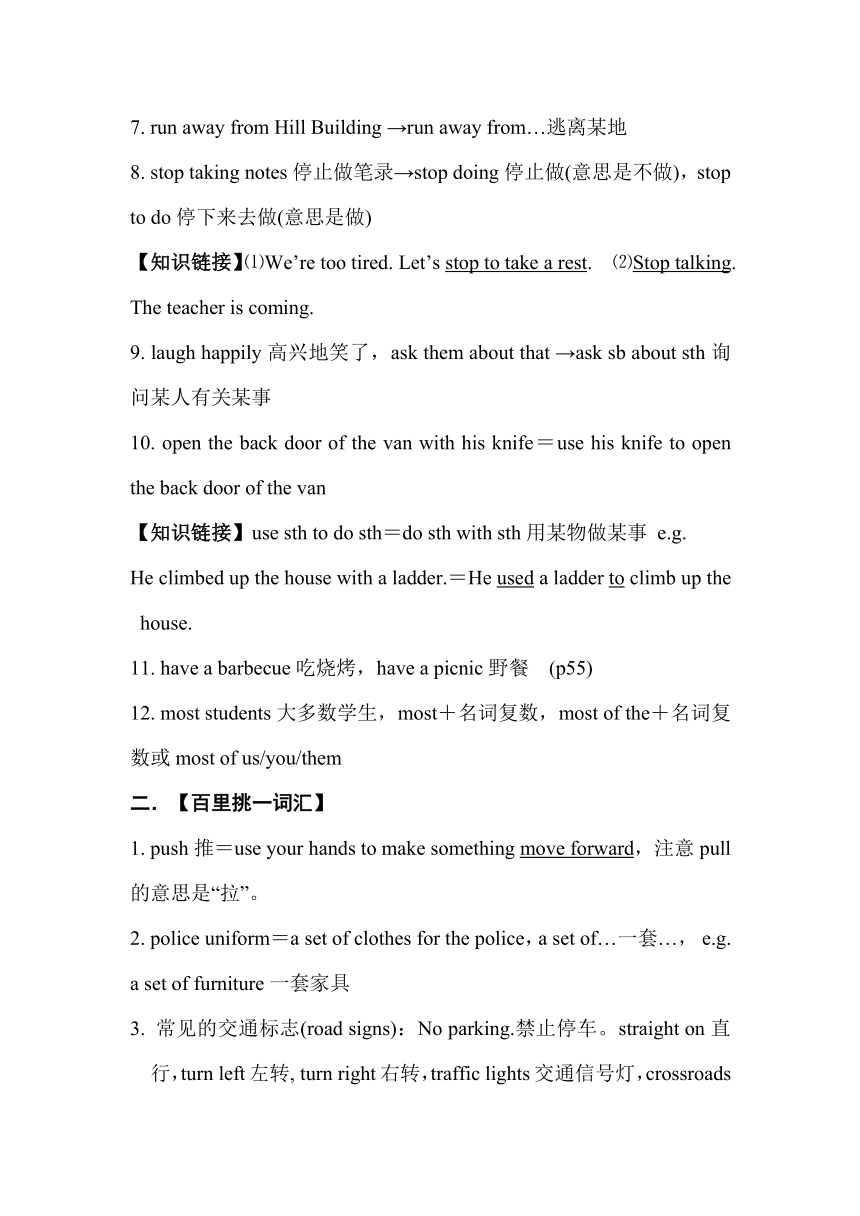
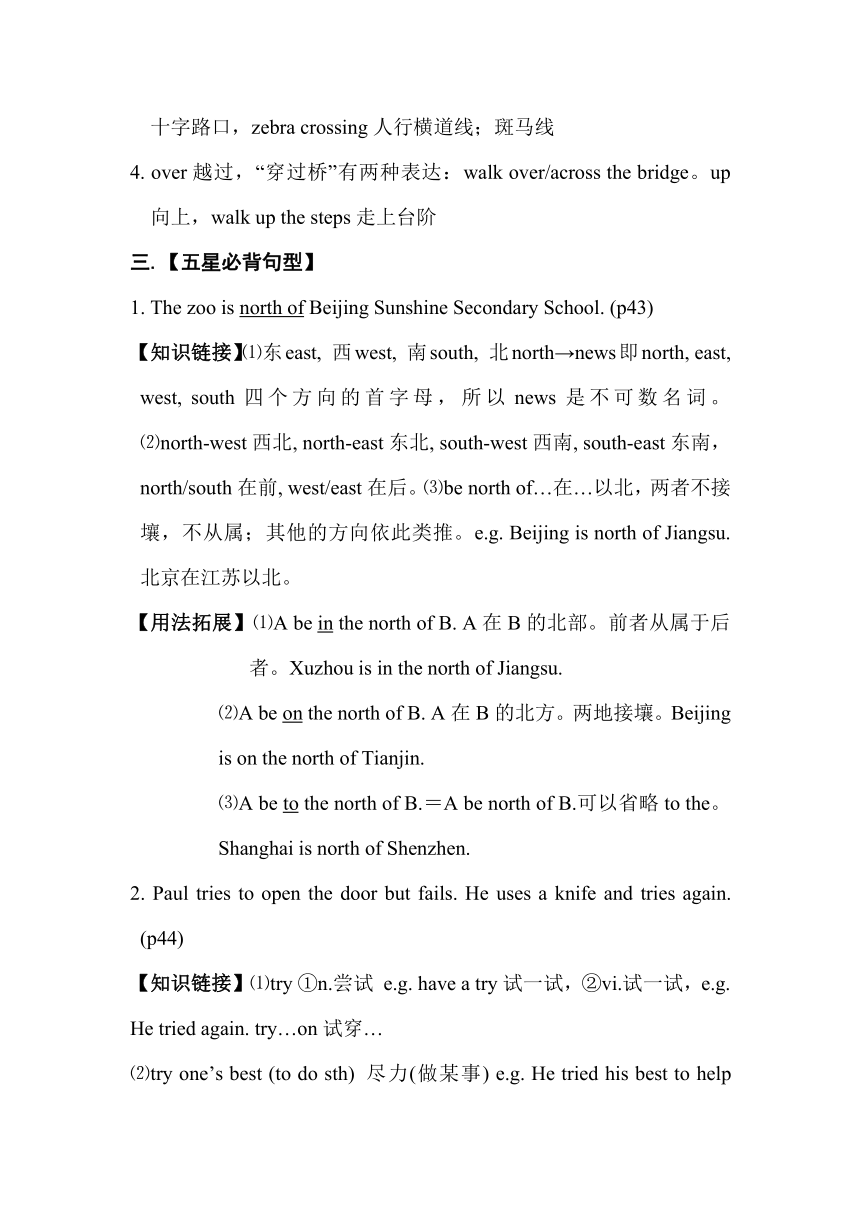
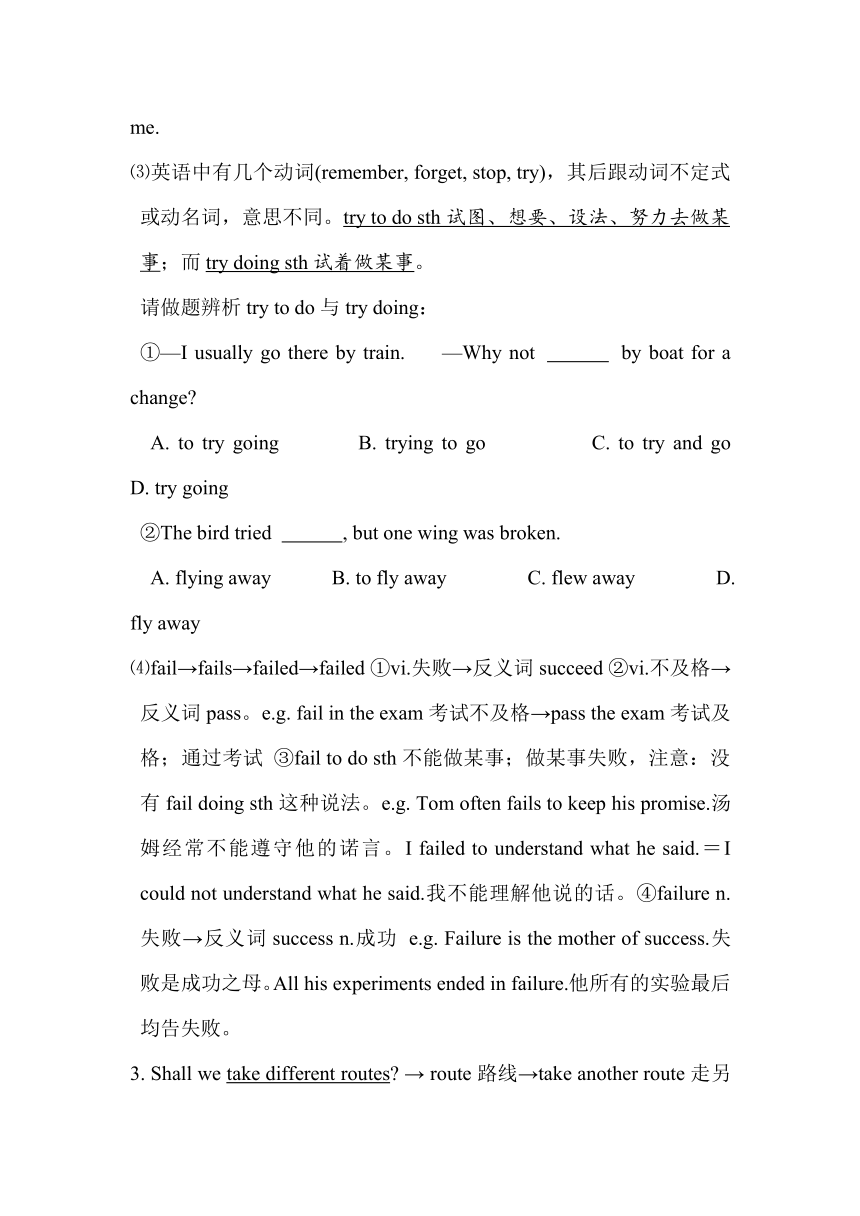
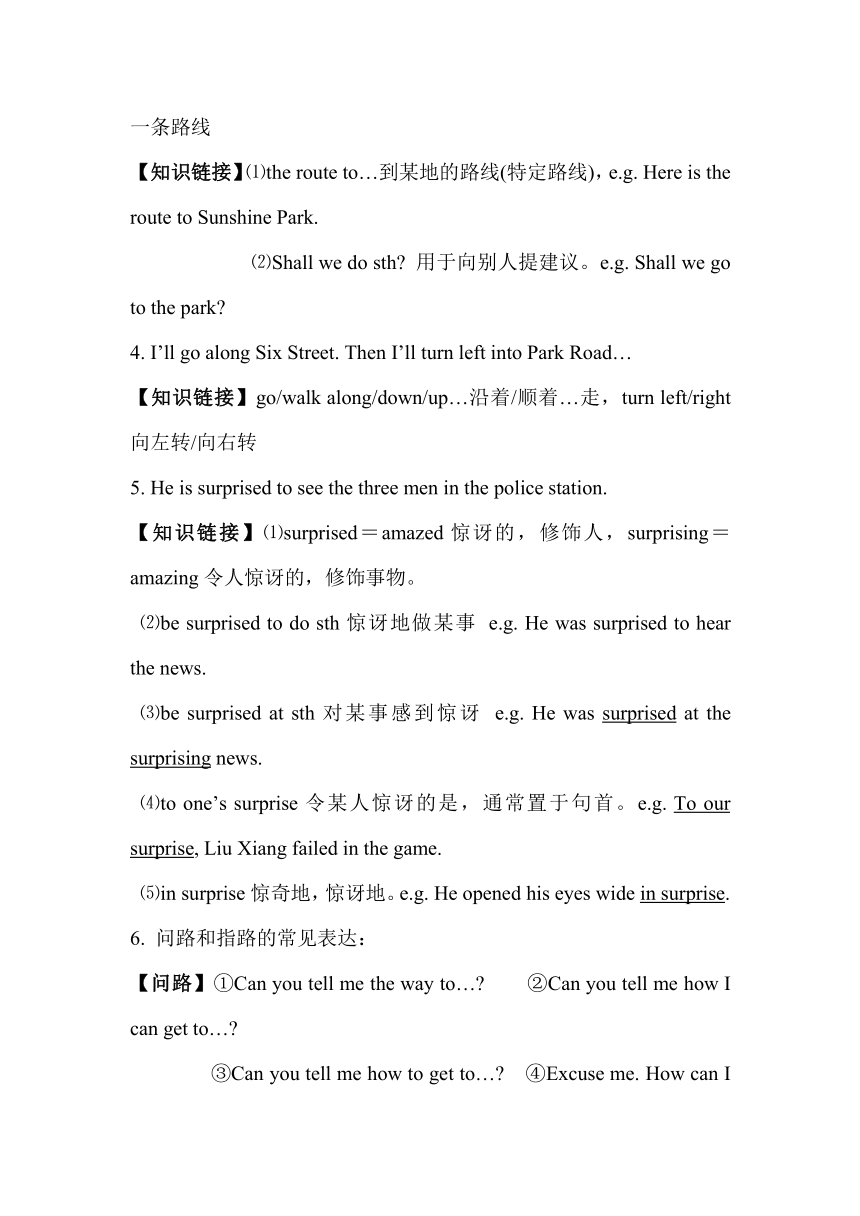
文档简介
第9课时-Unit 3 Finding your way, 7B
一.【精挑细选短语】
1. follow me=come with me跟我来 (p42)
【知识链接】follow vt.跟随→following adj.接着的e.g. the following day第二天
【用法拓展】follow sb’s advice采纳某人的建议 e.g. follow the doctor’s advice遵从医嘱
2. don’t be afraid别怕→be afraid of=be frightened of害怕…
【知识链接】⑴I’m afraid (that)…恐怕…。担心某事可能要发生或表示客气的回答。 e.g.①I’m afraid that I’ll be late.恐怕我要迟到。②I’m afraid he is not in.对不起他不在。⑵be afraid of sb/sth害怕某人或某物,be afraid of doing sth担心或害怕某事,be afraid to do sth(由于胆小)不敢做某事 e.g. ①Are you afraid of snakes ②He was afraid to walk across the one-logged bridge because he was afraid of falling into the river.因为他担心会掉进河里,他不敢过那个独木桥。
3. three men in police uniform三个穿警服的男子 → 介词短语in…作后置定语。 (p44)
4. get into…进入…→反义词:get out of…走出…
5. at once=right away=immediately立刻;马上,push…into…把…推进…
6. report to a policeman → report sth to sb向某人汇报某事, e.g. Please report it to the police.
7. run away from Hill Building →run away from…逃离某地
8. stop taking notes停止做笔录→stop doing停止做(意思是不做),stop to do停下来去做(意思是做)
【知识链接】⑴We’re too tired. Let’s stop to take a rest. ⑵Stop talking. The teacher is coming.
9. laugh happily高兴地笑了,ask them about that →ask sb about sth询问某人有关某事
10. open the back door of the van with his knife=use his knife to open the back door of the van
【知识链接】use sth to do sth=do sth with sth用某物做某事 e.g.
He climbed up the house with a ladder.=He used a ladder to climb up the house.
11. have a barbecue吃烧烤,have a picnic野餐 (p55)
12. most students大多数学生,most+名词复数,most of the+名词复数或most of us/you/them
二.【百里挑一词汇】
1. push推=use your hands to make something move forward,注意pull的意思是“拉”。
2. police uniform=a set of clothes for the police,a set of…一套…, e.g. a set of furniture一套家具
3. 常见的交通标志(road signs):No parking.禁止停车。straight on直行,turn left左转, turn right右转,traffic lights交通信号灯,crossroads十字路口,zebra crossing人行横道线;斑马线
4. over越过,“穿过桥”有两种表达:walk over/across the bridge。up向上,walk up the steps走上台阶
三.【五星必背句型】
1. The zoo is north of Beijing Sunshine Secondary School. (p43)
【知识链接】⑴东east, 西west, 南south, 北north→news即north, east, west, south四个方向的首字母,所以news是不可数名词。⑵north-west西北, north-east东北, south-west西南, south-east东南,north/south在前, west/east在后。⑶be north of…在…以北,两者不接壤,不从属;其他的方向依此类推。e.g. Beijing is north of Jiangsu.北京在江苏以北。
【用法拓展】⑴A be in the north of B. A在B的北部。前者从属于后者。Xuzhou is in the north of Jiangsu.
⑵A be on the north of B. A在B的北方。两地接壤。Beijing is on the north of Tianjin.
⑶A be to the north of B.=A be north of B.可以省略to the。Shanghai is north of Shenzhen.
2. Paul tries to open the door but fails. He uses a knife and tries again. (p44)
【知识链接】⑴try ①n.尝试 e.g. have a try试一试,②vi.试一试,e.g. He tried again. try…on试穿…
⑵try one’s best (to do sth) 尽力(做某事) e.g. He tried his best to help me.
⑶英语中有几个动词(remember, forget, stop, try),其后跟动词不定式或动名词,意思不同。try to do sth试图、想要、设法、努力去做某事;而try doing sth试着做某事。
请做题辨析try to do与try doing:
①—I usually go there by train. —Why not by boat for a change
A. to try going B. trying to go C. to try and go D. try going
②The bird tried , but one wing was broken.
A. flying away B. to fly away C. flew away D. fly away
⑷fail→fails→failed→failed ①vi.失败→反义词succeed ②vi.不及格→反义词pass。e.g. fail in the exam考试不及格→pass the exam考试及格;通过考试 ③fail to do sth不能做某事;做某事失败,注意:没有fail doing sth这种说法。e.g. Tom often fails to keep his promise.汤姆经常不能遵守他的诺言。I failed to understand what he said.=I could not understand what he said.我不能理解他说的话。④failure n.失败→反义词success n.成功 e.g. Failure is the mother of success.失败是成功之母。All his experiments ended in failure.他所有的实验最后均告失败。
3. Shall we take different routes → route路线→take another route走另一条路线
【知识链接】⑴the route to…到某地的路线(特定路线),e.g. Here is the route to Sunshine Park.
⑵Shall we do sth 用于向别人提建议。e.g. Shall we go to the park
4. I’ll go along Six Street. Then I’ll turn left into Park Road…
【知识链接】go/walk along/down/up…沿着/顺着…走,turn left/right向左转/向右转
5. He is surprised to see the three men in the police station.
【知识链接】⑴surprised=amazed惊讶的,修饰人,surprising=amazing令人惊讶的,修饰事物。
⑵be surprised to do sth惊讶地做某事 e.g. He was surprised to hear the news.
⑶be surprised at sth对某事感到惊讶 e.g. He was surprised at the surprising news.
⑷to one’s surprise令某人惊讶的是,通常置于句首。e.g. To our surprise, Liu Xiang failed in the game.
⑸in surprise惊奇地,惊讶地。e.g. He opened his eyes wide in surprise.
6. 问路和指路的常见表达:
【问路】①Can you tell me the way to… ②Can you tell me how I can get to…
③Can you tell me how to get to… ④Excuse me. How can I get to…
【指路】①Go/Walk along the road, take the first turning on the left/right.
②Go/Walk along the street, turn left/right at the first crossing.
③Cross the road at the traffic lights.
④Walk past…
7. Will you join us I don’t want to take it all day. (p50)
【知识链接】Will you join us 你愿意加入我们的行列吗?(邀请别人一起做某事。)
8. When you are at the big tree, turn left and walk towards the bridge. Cross the bridge, turn right and walk straight on. Walk down the path and you will see a wooden house on your left.
9. Walk straight on and you’ll see the traffic lights.
【知识链接】祈使句+and+一般将来时的句子。祈使句+or+一般将来时的句子。表示前面的情况而产生的结果,and通常后接好的结果,or通常后接不好的结果。e.g. ①Hurry up and we’ll catch the early bus. ②Hurry up, or we’ll miss the early bus.
10. 【因特网常识】(p54) The Internet is an international computer network. It connects computer networks all over the world. People can get different kinds of information from it. There are millions of websites on the Internet. There is a lot of useful information on the websites. You can use search engines to find the information you need. Search engines help us find information quickly and easily. Type in a keyword or keywords and the search engine will give you a list of suitable websites to look at.
11. We are happy to invite you to a farewell party for our friends from Britain. (p56)
【知识链接】⑴be happy to do sth高兴做某事 ⑵invite sb to sp邀请某人到某地→ sb be invited to sp某人应邀到某地 He was invited to Amy’s birthday party. ⑶invite sb to do sth邀请某人做某事→sb be invited to do sth某人应邀做某事,e.g. They were invited to attend the meeting.
12. We would like everybody to bring their own food and drink.
【知识链接】⑴would like sb to do sth ⑵bring表示带到说话者提到的地方,此时不能用take。
13. The map shows you how to get to Sunshine Park. 这张地图给你指明了去阳光公园的路线。
【知识链接】show sb how to do sth向某人演示如何做某事
14. We look forward to seeing you at our party. 我们期待在聚会上见到你们。
【知识链接】⑴at the party在聚会上,类似的使用at表示地点的有:at the cinema, at the airport, at the gate, at the entrance (to…), at the exit, at school, at the back of…→at the front of…, at the end of…, at the doctor’s, at the top of…→at the bottom of…, at the foot of…, at work, at table。
⑵look forward to sth期待/渴望/盼望某事,look forward to doing sth期待/渴望/盼望做某事
四.【中考无敌语法】运动方向介词、一般将来时
㈠运动方向介词
⒈以下介词常用于表示运动方向:
across, along, over, from…to…, into, out of, up, down, through, round/around。
⒉across从一面到另一面,横穿,e.g. go/walk across the road=cross the road穿过马路,swim across the river游过河(不能用swim through the river),go across the desert穿过沙漠
⒊along沿着,顺着e.g. go/walk along the street沿着这条街向前走
⒋over越过 e.g. jump over the chair从椅子上跳过,walk over the mountains越过高山
⒌from…to…从…到…,e.g. walk from my home to my school
⒍up向上,down向下,e.g. climb up the hill爬上山,walk down the stairs走下楼梯;下楼
⒎through穿过,从物体的内部穿过 go through the tunnel穿过隧道,walk through the forest穿过森林,The sun shines brightly through the window.明亮的阳光透过窗户照进来。
⒏round/around围绕;环绕e.g. The earth travels around the sun. show sb around…带领某人参观
㈡一般将来时
⒈一般将来时的构成:
肯定式:主语+shall/will+动词原形。 否定式:主语+shall/will not+动词原形
疑问式:Shall/Will+主语+动词原形 疑问否定式:Shall/Will+主语+not+动词原形
缩写式:will not→won’t, shall not→shan’t
⒉一般将来时的用法:
⑴表示将来发生的动作或存在的状态。常与表示将来的时间状语连用,如:
tomorrow, next week, in a few days, next Monday等。
⑵表示一种倾向或一种固有性或经常会发生的动作。
①Without air a living thing will die.
②When it gets warmer, the snow will start to melt.
③ A chair will not stand on two legs.
⑶表示我们正在制定的计划,常用We shall…. Shall we… Shall we take different routes
⒊表示将来的其他用法:
⑴“be going to+动词原形” 即“am/is/are) going to+动词原形”表示“就要…”、“打算…”等安排好的事或将要发生的事,将来很可能发生的事,根据天气迹象而作出的判断。
①She is going to be a nurse after she graduates.
②There’re many clouds in the sky. I think it’s going to rain.
注意:There is/are going to be…不能说成There is/are going to have…
⑵be about to+动词原形 表示即刻就要发生的动作。e.g.
He has packed his bag. He is about to start.他已收拾完毕,即刻出发。
一.【精挑细选短语】
1. follow me=come with me跟我来 (p42)
【知识链接】follow vt.跟随→following adj.接着的e.g. the following day第二天
【用法拓展】follow sb’s advice采纳某人的建议 e.g. follow the doctor’s advice遵从医嘱
2. don’t be afraid别怕→be afraid of=be frightened of害怕…
【知识链接】⑴I’m afraid (that)…恐怕…。担心某事可能要发生或表示客气的回答。 e.g.①I’m afraid that I’ll be late.恐怕我要迟到。②I’m afraid he is not in.对不起他不在。⑵be afraid of sb/sth害怕某人或某物,be afraid of doing sth担心或害怕某事,be afraid to do sth(由于胆小)不敢做某事 e.g. ①Are you afraid of snakes ②He was afraid to walk across the one-logged bridge because he was afraid of falling into the river.因为他担心会掉进河里,他不敢过那个独木桥。
3. three men in police uniform三个穿警服的男子 → 介词短语in…作后置定语。 (p44)
4. get into…进入…→反义词:get out of…走出…
5. at once=right away=immediately立刻;马上,push…into…把…推进…
6. report to a policeman → report sth to sb向某人汇报某事, e.g. Please report it to the police.
7. run away from Hill Building →run away from…逃离某地
8. stop taking notes停止做笔录→stop doing停止做(意思是不做),stop to do停下来去做(意思是做)
【知识链接】⑴We’re too tired. Let’s stop to take a rest. ⑵Stop talking. The teacher is coming.
9. laugh happily高兴地笑了,ask them about that →ask sb about sth询问某人有关某事
10. open the back door of the van with his knife=use his knife to open the back door of the van
【知识链接】use sth to do sth=do sth with sth用某物做某事 e.g.
He climbed up the house with a ladder.=He used a ladder to climb up the house.
11. have a barbecue吃烧烤,have a picnic野餐 (p55)
12. most students大多数学生,most+名词复数,most of the+名词复数或most of us/you/them
二.【百里挑一词汇】
1. push推=use your hands to make something move forward,注意pull的意思是“拉”。
2. police uniform=a set of clothes for the police,a set of…一套…, e.g. a set of furniture一套家具
3. 常见的交通标志(road signs):No parking.禁止停车。straight on直行,turn left左转, turn right右转,traffic lights交通信号灯,crossroads十字路口,zebra crossing人行横道线;斑马线
4. over越过,“穿过桥”有两种表达:walk over/across the bridge。up向上,walk up the steps走上台阶
三.【五星必背句型】
1. The zoo is north of Beijing Sunshine Secondary School. (p43)
【知识链接】⑴东east, 西west, 南south, 北north→news即north, east, west, south四个方向的首字母,所以news是不可数名词。⑵north-west西北, north-east东北, south-west西南, south-east东南,north/south在前, west/east在后。⑶be north of…在…以北,两者不接壤,不从属;其他的方向依此类推。e.g. Beijing is north of Jiangsu.北京在江苏以北。
【用法拓展】⑴A be in the north of B. A在B的北部。前者从属于后者。Xuzhou is in the north of Jiangsu.
⑵A be on the north of B. A在B的北方。两地接壤。Beijing is on the north of Tianjin.
⑶A be to the north of B.=A be north of B.可以省略to the。Shanghai is north of Shenzhen.
2. Paul tries to open the door but fails. He uses a knife and tries again. (p44)
【知识链接】⑴try ①n.尝试 e.g. have a try试一试,②vi.试一试,e.g. He tried again. try…on试穿…
⑵try one’s best (to do sth) 尽力(做某事) e.g. He tried his best to help me.
⑶英语中有几个动词(remember, forget, stop, try),其后跟动词不定式或动名词,意思不同。try to do sth试图、想要、设法、努力去做某事;而try doing sth试着做某事。
请做题辨析try to do与try doing:
①—I usually go there by train. —Why not by boat for a change
A. to try going B. trying to go C. to try and go D. try going
②The bird tried , but one wing was broken.
A. flying away B. to fly away C. flew away D. fly away
⑷fail→fails→failed→failed ①vi.失败→反义词succeed ②vi.不及格→反义词pass。e.g. fail in the exam考试不及格→pass the exam考试及格;通过考试 ③fail to do sth不能做某事;做某事失败,注意:没有fail doing sth这种说法。e.g. Tom often fails to keep his promise.汤姆经常不能遵守他的诺言。I failed to understand what he said.=I could not understand what he said.我不能理解他说的话。④failure n.失败→反义词success n.成功 e.g. Failure is the mother of success.失败是成功之母。All his experiments ended in failure.他所有的实验最后均告失败。
3. Shall we take different routes → route路线→take another route走另一条路线
【知识链接】⑴the route to…到某地的路线(特定路线),e.g. Here is the route to Sunshine Park.
⑵Shall we do sth 用于向别人提建议。e.g. Shall we go to the park
4. I’ll go along Six Street. Then I’ll turn left into Park Road…
【知识链接】go/walk along/down/up…沿着/顺着…走,turn left/right向左转/向右转
5. He is surprised to see the three men in the police station.
【知识链接】⑴surprised=amazed惊讶的,修饰人,surprising=amazing令人惊讶的,修饰事物。
⑵be surprised to do sth惊讶地做某事 e.g. He was surprised to hear the news.
⑶be surprised at sth对某事感到惊讶 e.g. He was surprised at the surprising news.
⑷to one’s surprise令某人惊讶的是,通常置于句首。e.g. To our surprise, Liu Xiang failed in the game.
⑸in surprise惊奇地,惊讶地。e.g. He opened his eyes wide in surprise.
6. 问路和指路的常见表达:
【问路】①Can you tell me the way to… ②Can you tell me how I can get to…
③Can you tell me how to get to… ④Excuse me. How can I get to…
【指路】①Go/Walk along the road, take the first turning on the left/right.
②Go/Walk along the street, turn left/right at the first crossing.
③Cross the road at the traffic lights.
④Walk past…
7. Will you join us I don’t want to take it all day. (p50)
【知识链接】Will you join us 你愿意加入我们的行列吗?(邀请别人一起做某事。)
8. When you are at the big tree, turn left and walk towards the bridge. Cross the bridge, turn right and walk straight on. Walk down the path and you will see a wooden house on your left.
9. Walk straight on and you’ll see the traffic lights.
【知识链接】祈使句+and+一般将来时的句子。祈使句+or+一般将来时的句子。表示前面的情况而产生的结果,and通常后接好的结果,or通常后接不好的结果。e.g. ①Hurry up and we’ll catch the early bus. ②Hurry up, or we’ll miss the early bus.
10. 【因特网常识】(p54) The Internet is an international computer network. It connects computer networks all over the world. People can get different kinds of information from it. There are millions of websites on the Internet. There is a lot of useful information on the websites. You can use search engines to find the information you need. Search engines help us find information quickly and easily. Type in a keyword or keywords and the search engine will give you a list of suitable websites to look at.
11. We are happy to invite you to a farewell party for our friends from Britain. (p56)
【知识链接】⑴be happy to do sth高兴做某事 ⑵invite sb to sp邀请某人到某地→ sb be invited to sp某人应邀到某地 He was invited to Amy’s birthday party. ⑶invite sb to do sth邀请某人做某事→sb be invited to do sth某人应邀做某事,e.g. They were invited to attend the meeting.
12. We would like everybody to bring their own food and drink.
【知识链接】⑴would like sb to do sth ⑵bring表示带到说话者提到的地方,此时不能用take。
13. The map shows you how to get to Sunshine Park. 这张地图给你指明了去阳光公园的路线。
【知识链接】show sb how to do sth向某人演示如何做某事
14. We look forward to seeing you at our party. 我们期待在聚会上见到你们。
【知识链接】⑴at the party在聚会上,类似的使用at表示地点的有:at the cinema, at the airport, at the gate, at the entrance (to…), at the exit, at school, at the back of…→at the front of…, at the end of…, at the doctor’s, at the top of…→at the bottom of…, at the foot of…, at work, at table。
⑵look forward to sth期待/渴望/盼望某事,look forward to doing sth期待/渴望/盼望做某事
四.【中考无敌语法】运动方向介词、一般将来时
㈠运动方向介词
⒈以下介词常用于表示运动方向:
across, along, over, from…to…, into, out of, up, down, through, round/around。
⒉across从一面到另一面,横穿,e.g. go/walk across the road=cross the road穿过马路,swim across the river游过河(不能用swim through the river),go across the desert穿过沙漠
⒊along沿着,顺着e.g. go/walk along the street沿着这条街向前走
⒋over越过 e.g. jump over the chair从椅子上跳过,walk over the mountains越过高山
⒌from…to…从…到…,e.g. walk from my home to my school
⒍up向上,down向下,e.g. climb up the hill爬上山,walk down the stairs走下楼梯;下楼
⒎through穿过,从物体的内部穿过 go through the tunnel穿过隧道,walk through the forest穿过森林,The sun shines brightly through the window.明亮的阳光透过窗户照进来。
⒏round/around围绕;环绕e.g. The earth travels around the sun. show sb around…带领某人参观
㈡一般将来时
⒈一般将来时的构成:
肯定式:主语+shall/will+动词原形。 否定式:主语+shall/will not+动词原形
疑问式:Shall/Will+主语+动词原形 疑问否定式:Shall/Will+主语+not+动词原形
缩写式:will not→won’t, shall not→shan’t
⒉一般将来时的用法:
⑴表示将来发生的动作或存在的状态。常与表示将来的时间状语连用,如:
tomorrow, next week, in a few days, next Monday等。
⑵表示一种倾向或一种固有性或经常会发生的动作。
①Without air a living thing will die.
②When it gets warmer, the snow will start to melt.
③ A chair will not stand on two legs.
⑶表示我们正在制定的计划,常用We shall…. Shall we… Shall we take different routes
⒊表示将来的其他用法:
⑴“be going to+动词原形” 即“am/is/are) going to+动词原形”表示“就要…”、“打算…”等安排好的事或将要发生的事,将来很可能发生的事,根据天气迹象而作出的判断。
①She is going to be a nurse after she graduates.
②There’re many clouds in the sky. I think it’s going to rain.
注意:There is/are going to be…不能说成There is/are going to have…
⑵be about to+动词原形 表示即刻就要发生的动作。e.g.
He has packed his bag. He is about to start.他已收拾完毕,即刻出发。
